The latest Commons Political Reform Committee report illustrates popular opinion on voter engagement measures
The House of Commons Political and Constitutional Reform Committee recently released a new report evaluating a range of ideas to increase political engagement and to stem the tide of apathy towards democracy. Democratic Audit’s Carl Cullinane runs the rule over the report, assessing its recommendations and findings on voting, registration and voter information.

Credit: Paul Tridon, CC BY 2.0
Earlier this month, the House of Commons Political and Constitutional Reform Committee published their follow up report on Voter Engagement in the UK. It includes feedback from a consultation period with stakeholders in the area of political reform, along with some interesting survey results from online polling by several organisations as part of the consultation process. While the Report acknowledges that a major source of voter disengagement is the wider issue of disillusionment with politics in the UK, it concludes with a series of policies recommended consideration in order to reduce barriers to electoral participation and increase engagement. These recommendations fall into three broad categories, those aimed at voter registration, those aimed at election day turnout, and those aimed at increased engagement generally.
Voter Registration
The recent move to Individual Electoral Registration (IER) has led to well publicised concerns about the completeness of the register and potential for disenfranchisement at the polling booth. The Committee calls, as a matter of urgency, for the money already allocated to be spent on raising awareness of the new arrangements in order to ensure the current shortfall in the register is made up. It also recommends consideration of an extension of transitional arrangements to make sure that once the full switch to individual registration is complete, no-one has fallen through the gaps.
Looking beyond May 2015, the Report evaluates several options for increasing voter registration. Firstly, that registration be made compulsory. While this was a popular measure among respondents to the consultation, with 65% of the circa 16,000 polled in favour, there are practical barriers to this in terms of enactment and enforcement. Less radical alternatives are also posited, including prompting citizens to join the electoral register whenever they use a variety of public services, such as health services, utilities or the Deposit Protection Service. The Electoral Commission and the Association of Electoral Administrators are both strongly in favour of taking advantage of this to “increase the accuracy and completeness” of the electoral register.
n=16061
A second main strand of this area is the timing of electoral registration. For the forthcoming election, the deadline for registration will be April 20th, 14 working days before the election. Given the new online system, registration could potentially be extended up to, and possibly including, the election day itself. Proponents argue that this would minimise barriers to voting, by ensuring those energised and engaged by the final days of the campaign will be able to vote. Opponents however warn of the potential for increased fraud on election day. These divisions were reflected in a mixed popular response to Election Day registration, with respondents almost equally split.
Voter Turnout
n=13458
Several options were proposed by the Committee for consideration in order to increase electoral turnout. Timing of Election Day was a significant one. While opinion among survey respondents was strongly against making polling day a public holiday, 49.5% were in favour of holding elections at the weekend, in order to allow a broader range of people more time to visit the polling booth. Stakeholders and government both warn of the potential logistical difficulties for staff and facilities hire at the weekend, though the experience of other European countries shows these difficulties are not insurmountable.
n=1123
A more radical proposal, allowing voters to cast their ballot online found much support, and was supported by almost 60% of respondents in the consultation surveys. It was also by a distance the most popular of a range of measures in a nationally representative survey conducted by the Hansard Society. While concerns remain about ballot secrecy, fraud, high costs and the potential for technical problems, allied with evidence that suggests minimal impact on turnout, voting online is a clear popular choice among respondents to the committee consultation.
n=16040
A third, and equally significant measure would be making voting a legal obligation, a proposal that remains divisive. While 65% were in favour of making registration compulsory, only 46% were in favour of making voting itself compulsory, with respondents and the Committee itself split down the middle on the issue. The Report nonetheless recommends a Government consultation early in the next Parliament on the ideas of voting and civic duty, a debate which in itself could serve to benefit voter engagement.
General Voter Engagement
The Report calls for better provision of voter information, including better information on candidates, better information on election results, and improved public awareness of registration and elections. While they call for centralised and independent provision of such information and promotion, in the meantime, third sector bodies have moved to fill the gap, including a swathe of Voter Advice Applications (VAA’s) from Bite the Ballot to VoteMatch. With the Committee Report, and the Speaker’s Commission on Digital Democracy both calling for improved provision of election information, Democratic Audit ourselves are developing the Democratic Dashboard, a ‘results bank’ of locally-focused constituency information and statistics to fill that information gap.
n=16142
Since the Scottish Independence Referendum, reducing the voting age to 16 has gained currency among proponents of electoral reform. The Report cites research from the Electoral Commission indicating that both registration and turnout among 16/17 year olds was high in the September referendum, with an estimated 75% turnout, in comparison to 54% among 18-24 year olds. This gap emphasises some of the main arguments of those in favour of lowering the age of enfranchisement, namely that due to the fact younger people are still in school and living at home, they are more likely to be in an environment that encourages voting; and that furthermore, this early act of voting is likely to be habit-forming, increasing the likelihood of turnout into their twenties. Despite the increase in popularity of the idea, the consultation still found just over 50% of respondents against lowering the voting age to 16.
n=15840
Of all the proposals put to the survey, the most popular is perhaps a surprising one: the inclusion of a ‘None of the Above’ option on the ballot paper, with over 70% of respondents in favour. A controversial measure, it would allow a process of ‘active abstention’, and enable voters engaged with political issues, but dissatisfied by the candidates and parties, to register this dissatisfaction officially. The Electoral Commission has opposed this option, emphasising the role of elections as a choice to elect candidates to office, though proponents argue that such an opportunity to register dissatisfaction would be of benefit to both turnout and political engagement in general.
While the Committee make few concrete recommendations, particularly on measures that are divisive, its recommendation that Government take political engagement seriously and embark on a genuine consultative and potentially legislative process to improve it is a highly important one. Given the current widespread malaise with politicians and political discourse in the UK, this is unlikely to be enough on its own. The Report itself notes that the extremely high level of engagement in the Scottish Independence Referendum was in part because “the vote was one of significance… and every vote was seen to matter”. However, as we can see, there is no shortage of practical and administrative issues that also need to be addressed.
Ultimately, alongside the urgent need for the political establishment to convince people of the importance of the issues at stake in national elections, there also needs to be a process of technical reform that both reduces barriers to, and ultimately fosters, electoral engagement and participation. Using the excellent work of the Reform Committee as a springboard to demonstrate a genuine commitment to the latter would be a step in the right direction towards persuading the electorate that Westminster is interested in the former.
—
Note: Consultation survey findings are the consolidated results of four online surveys conducted by the Reform Committee itself, Bite the Ballot, Unlock Democracy and 38 Degrees, at the end of 2014 and beginning of 2015. The Hansard Society survey was conducted by GfK NOP on a representative quota sample of 1123 adults in November/December 2014.
This post represents the views of the author and not those of Democratic Audit or the LSE. Please read our comments policy before posting.
—
 Carl Cullinane is Research Assistant at the Democratic Audit, and is responsible for conducting in-house research along with heading up the Audit’s Democratic Dashboard project and contributing to the blog and other DA outputs. He holds a degree in Philosophy and Political Science from Trinity College Dublin, along with MSc’s in Philosophy & Public Policy from the LSE and Applied Social Research, also from Trinity College.
Carl Cullinane is Research Assistant at the Democratic Audit, and is responsible for conducting in-house research along with heading up the Audit’s Democratic Dashboard project and contributing to the blog and other DA outputs. He holds a degree in Philosophy and Political Science from Trinity College Dublin, along with MSc’s in Philosophy & Public Policy from the LSE and Applied Social Research, also from Trinity College.
He has worked for the Irish Ombudsman for Children, the Economic and Social Research Institute, and NatCen Social Research, joining the Democratic Audit in Summer 2014. He can be found on twitter at @cullinanecarl

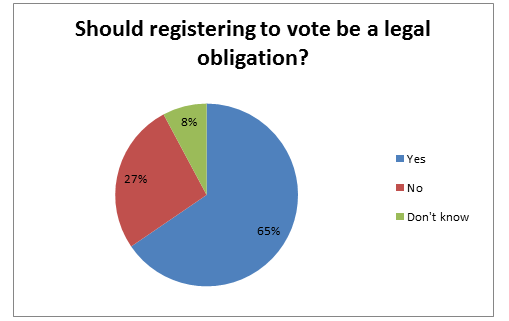
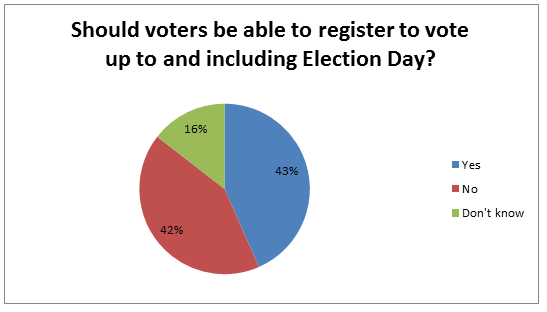
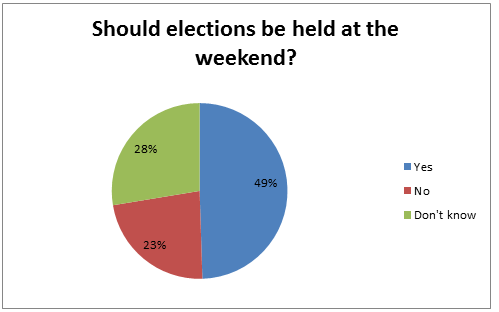
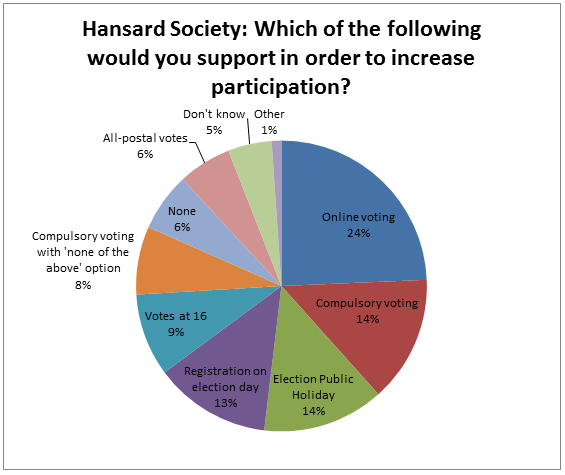
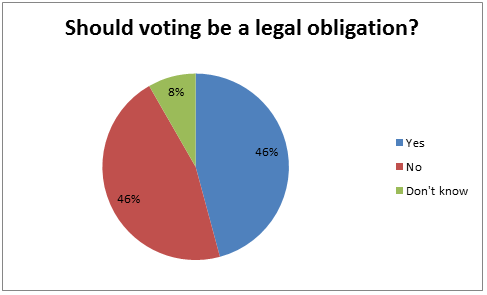
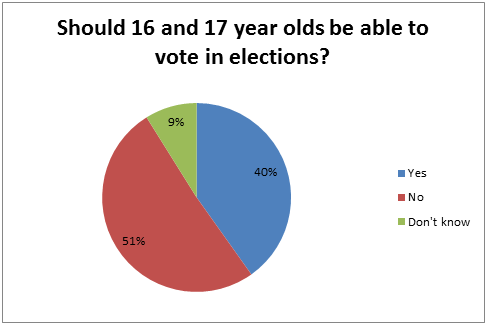
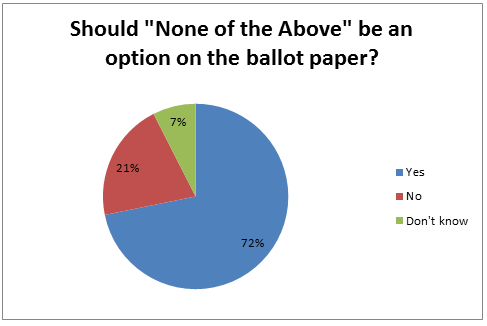




 Democratic Audit's core funding is provided by the Joseph Rowntree Charitable Trust. Additional funding is provided by the London School of Economics.
Democratic Audit's core funding is provided by the Joseph Rowntree Charitable Trust. Additional funding is provided by the London School of Economics.
AS Unit 1-Pol Participation: Report illustrates popular opinion on voter engagement measures #democraticrenewal https://t.co/LwYAQMLD4L
Compulsory voting, Votes at 16, Voting Online, None of the Above: The right tools to fight voter disengagement? https://t.co/DqI0HDaqD1
The article is a good summary of the Select Committee’s report but let’s look at the main proposals in the context of raising election turnouts.
Making registration easier and/or compulsory may increase registration but would not necessarily increase turnout when about 7 out of 10 constituencies are so safe that voting cannot make any difference there. It might even decrease turnout as a percentage of registered electors.
Making voting easier, for example with weekend and online voting, may increase turnout a little, but it is unlikely to make much difference in the 7 out of 10 constituencies, where voting cannot make any difference because they are all safe for one party or another and the result is a foregone conclusion. Also voters would need to be assured that online votes would go to the intended candidates and that a programming error or fraudulent hacking could not affect the result.
The Committee called for more information for voters, but the leading parties in marginal constituencies already provide considerable information for voters and there is no incentive for them to provide much information in safe constituencies.
Would lowering the voting age to 16 increase turnout? Maybe and maybe not but are there not many, more important, arguments for and against this? Anyway, is there much point in giving votes to 16 year-olds that would be as worthless in safe seats as the votes their elders already have? It should be a higher priority to make all votes effective than to give ineffective votes to even more people.
The introduction of None Of The Above (NOTA) to ballot forms is a popularist notion, which could help very occasionally when one really disapproves of all the candidates, but it is less necessary than ever now that many English constituencies will have at least five candidates and many Scottish and Welsh will have at least six. It will not help at all when one or more of the candidates are perfectly acceptable but the result is a foregone conclusion because the constituency is safe for one of the parties.
NOTA might not do much harm in itself, but it will not do much good and it will be harmful if, because people think it will help, it postpones the real reform of abolishing safe seats that is needed.
The Select Committee’s most important recommendation is its rather grudging one that there should be research after the General Election into voting systems.
If we had a voting system that people recognized could make all their votes effective, they might be more inclined to vote as they were in the Scottish referendum, when it was clear that every vote could make a difference.
The best system to achieve that would be the Single Transferable Vote (STV), which is already used for Scottish local elections, for all elections (except of MPs) in Northern Ireland and for many NHS Trust elections. I recommend http://www.stvAction.org.uk for information about STV.
#onlinevoting is the most popular measure to boost voter turnout according to @commonsPolCon https://t.co/9zQZ08gGAe https://t.co/7D6dq6CrGh
The latest @commonsPolCon report illustrates popular opinion on voter engagement measures by @CullinaneCarl https://t.co/DNWHMGkmFe
Any lesson for NZ? “@democraticaudit: popular opinion on voter engagement measures by @CullinaneCarl https://t.co/YAIHth4kYB”
A good analysis of the issues highlighted by the report. On the issue of NOTA, for those interested I responded a few week ago to the article linked to citing it as a ‘controversial measure’ explaining why it really shouldn’t be:
“Why NOTA is the ground zero of electoral reform”
https://www.democraticaudit.com/?p=10733
I also appeared on RT’s ‘Going Underground’ to talk about it: https://www.youtube.com/watch?v=QdiG9tCq-BU
More info on our campaign can be found here: https://www.nota-uk.org
The latest Commons Political Reform Committee report illustrates popular opinion on voter eng… https://t.co/4O79WDz5WF https://t.co/HXAOgrfVdD
The latest Commons Political Reform Committee report illustrates popular opinion on voter engagement measures https://t.co/aZWK2Hifqx
How to fix voter disengagement in the UK?A piece on @GrahamAllenMP’s Political Reform Committee for @democraticaudit: https://t.co/Vrw1v2nhCe
The latest Commons Political Reform Committee report shows the state of public opinion on voter engagement measures https://t.co/VT5QzMKXQN
I’ve written a piece on the Commons Political Reform Committee and addressing voter disengagement: https://t.co/iRgJ5y6544
The latest Commons Political Reform Committee report illustrates popular opinion on voter engagement measures https://t.co/YzyUcTlDBd